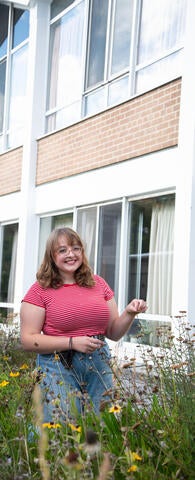At Grebel, sustainability and the environment are of great importance to students. From campfires after dark at Orientation Week, to weekends spent outdoors building community at Camp Trillium, to vibrant Environment Committee meetings, creation is a central part of life here. Recently, it has become clear that urgent change is needed to preserve and protect the natural world. To ensure that the Grebel community is doing its part to mitigate the worst impacts of the climate crisis, students have spearheaded an initiative that puts institutional sustainability at the forefront of our facility.
When I was appointed as the Environment Representative in fall 2020 with Eva Booker, another first-year student, we were conflicted. While we were extremely excited to be given the opportunity to steer Grebel towards sustainability, we were also very intimidated—we were both in our first year and talking to Student Council and College administration about sustainability issues was daunting.
As we talked to other students, we realized the importance of our role as advocates for the student body—sustainability is something that students at Grebel care deeply about. Moreover, many students believed that Grebel was not doing enough to take action on the climate crisis. In early 2021, we created a survey to quantify student needs for the administration. The results were overwhelming: sustainability was a major concern for students and they wanted to see more meaningful climate action from our community. Most notably, 98.1% of students believed that Grebel should set reduction targets in at least one of three areas: greenhouse gas emissions, waste, and water. Additionally, 96.3% of students believed that Grebel should aim to reduce emissions by 50% by 2030, as per the findings of the Intergovernmental Panel on Climate Change.
 Ceileigh McAllister, Grebel Student Council Environment Rep
Ceileigh McAllister, Grebel Student Council Environment Rep
When we brought this data to administration, they were quick to act. Led by Paul Penner, the administration connected with engineering consultants at WalterFedy to establish baseline energy and water consumption data. In the audit (conducted by recent Grebel alumnus Max Chute!) possible energy and water conservation measures were identified. Grebel also joined the Regional Sustainability Initiative, a program run by local startup Sustainable Waterloo Region. Founded by recently elected Kitchener Centre MP Mike Morrice, SWR empowers local businesses to set reduction targets. Recently, we put together a Green Team to explore and advise on next steps. This team will be instrumental in the process of setting reduction targets as well as meeting them.
Student Council was also extremely supportive of our asks, creating a sustainability initiatives fee to help finance physical infrastructure updates, which was passed in a referendum voted on by the student body. Students now pay an additional $15 per term on top of residence fees to support our sustainability initiatives, demonstrating student commitment to this project.
In the short term, I would like to see us set ambitious reduction targets. In the long term, I would like to see Grebel not only achieve but exceed these targets. Grebel has the absolute obligation to do this: not only as an institution based on Anabaptist values that should centre creation care and principles of climate justice and equity in our operations, but as a home for students. Our future is threatened—large parts of our planet will be completely unlivable in our lifetime if we do not see immediate and ambitious change from all areas of society. Students go to Grebel to grow into adulthood, build relationships, and study for their futures. We need to do our part to ensure there is a future ahead for us to look forward to.






